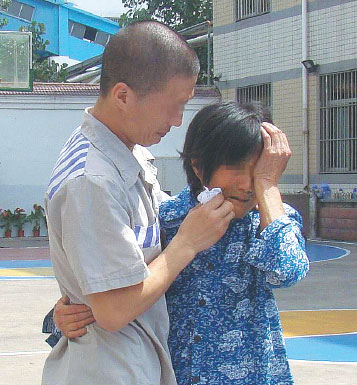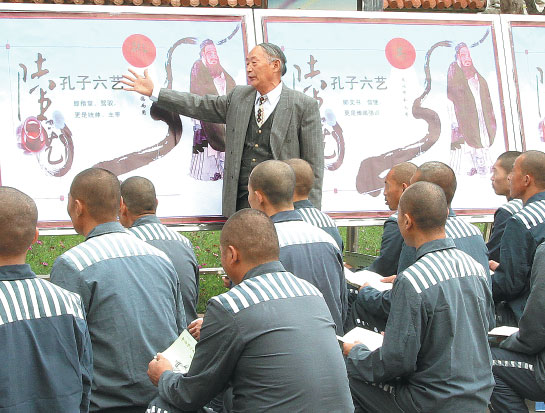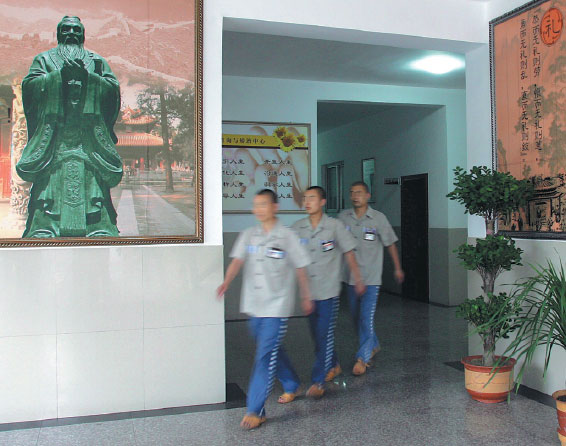Confucianism keeps convicts on the straight and narrow
Updated: 2016-07-20 07:45
By Zhang Yi(China Daily)
|
||||||||
"If we incite people to do good by issuing decrees and meting out punishment, all we shall do is create those who fear the stick rather than those who revere doing right; but if we lead people on a just path with morality, we will breed a people imbued with an awareness of shame and they will submit themselves to governance."
Although those words were uttered by the Chinese sage Confucius about 2,500 years ago, they still have great resonance today, especially for the inmates of Yunhe prison in Shandong province.
In the past 24 years, more than 3,200 prisoners have "graduated" from the Yunhe Confucius Distance Learning College, which offers courses that expound on the sage's philosophy and are designed to rehabilitate offenders and prepare them for life outside prison. So far, about 1,000 of the graduates have found work in the low-end technology sector.
The college has distilled the basic concepts of the philosophy into 14 classes, one for each of the known works of Confucius, and it takes about two years to complete the entire course of study. The emphasis is placed firmly on restoring the inmates' sense of right and wrong.
The prison college, established in 1992, was the first of its kind in China. In addition to lectures by prison officers and online classes, Confucian scholars from across the country are invited to visit the prison once a month and teach classes for three days.
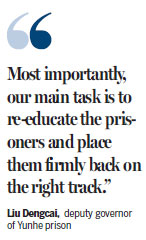
"If the prisoners sit around without doing anything, they are likely to get into fights. The idea of providing higher education was the result of a debate about how to make the best use of their time," said Liu Dengcai, the prison's deputy governor.
Although the Confucius teaching project has won plaudits from educationalists and penal experts, when the founders decided to turn their idea into reality, they had a hard time persuading institutions to provide teachers.
"The teachers feared the prisoners would be unwilling to learn anything they taught," said Liu Dengcai, deputy governor of Yunhe prison, Shandong province.
Having discussed the idea with a number of colleges and universities in Shandong, Liu and his colleagues eventually decided to work with Qufu Normal University, which provided intellectual support.
Working with university teachers, the prison officers adapted the sage's teachings to produce new textbooks that would make it easier for inmates to grasp the basic concepts of Confucianism.
Liu believes prison mangers need to understand the maxim: "Strict punishment and lenient treatment should be complementary to each other in order to maintain good governance."
For the prisoners, one overarching Confucian concept concerning the production of moral individuals is perfect for educational purposes. It requires people to display benevolence, righteousness and propriety, in addition to trustworthiness, loyalty and filial piety.
"I will never forget a lecture given by Bao Pengshan, a renowned scholar of Confucianism. He told us a great man should be one who is able to rectify his mistakes," said "Hao Xue" (his name has been changed to protect his privacy), an inmate who completed the course in Yunhe in 2010. "Bearing this line in mind, I want to reshape my personality and try to be a man of noble character."
Rehabilitation
According to Liu, the nation has a high number of convicted offenders, which means prisons are crowded and maintaining order can be a challenge. Despite that, the courses in Confucianism remain a cornerstone of the approach to rehabilitation in Yunhe prison.
"Most importantly, our main task is to re-educate the prisoners and place them firmly back on the right track," he said.
In 2008, the college achieved a major breakthrough when it was authorized to act as an exam center for students who are unable to take exams in the normal way. Inmates can take the national "self-taught" exam - for those outside the formal education system - while in prison, and the credits they gain can be used as evidence of a reformed character when the authorities are considering the reduction of their sentence.
In recent years, the success of the Yunhe project has prompted six other rehabilitation centers to offer similar courses. The latest was established at Luzhong prison, in central Shandong, in May.
One of the essential Confucian concepts emphasizes conscientious ethical behavior to cultivate close, loving relationships, especially between families, friends and neighbors, according to Wang Hanyu, a lecturer who has taught Confucian philosophy at a number of corrective centers and prisons in the province.
The practice of educating inmates through moral teaching rather than punishment accord with a resurgence of Confucian thought in modern society.
Wang, who is also deputy secretary-general of the Research Society on Confucius Business Theory in Shandong, believes the Chinese word xiao, which means "filial piety", is an important component of the concept that underpins family relationships.
"The concept is firmly rooted in the minds of every person in China and has been adopted by most households nowadays. It has a huge bearing on every inmate too. It makes it easier for people to empathize with the prisoners, which in turn helps them to return to their families and reintegrate into society when they are released from prison," she said.
Li Xiang (his name has been changed to protect his privacy), an inmate at Yunhe who completed the two-year course in 2012, said he has benefited from the courses. "I've learned the way a person should behave. As the philosopher said, 'Do not do to others what you do not want others to do to you'," he said.
"The words of the Master have taught me how to treat other people and how to be tolerant in daily life. I want to make reparation to those I hurt before and try my best to repay those who have helped me to rebuild my life."
Contact the writer at zhang_yi@chinadaily.com.cn
|
A mother with her son at Yunhe prison in September 2011. |
|
Liu Fengguang, professor of Confucianism at Qufu Normal University, gives a lecture on Confucius' teachings in Yunhe prison in 2011. Photos Provide To China Daily |
|
Inmates at Yunhe prison leave after a class in the four-story teaching building in the prison compound. In recent years, about 200 inmates have enrolled in the Yunhe Confucius Distance Learning College every year. |
(China Daily 07/20/2016 page1)

 Taiwan bus fire: Tour turns into sad tragedy
Taiwan bus fire: Tour turns into sad tragedy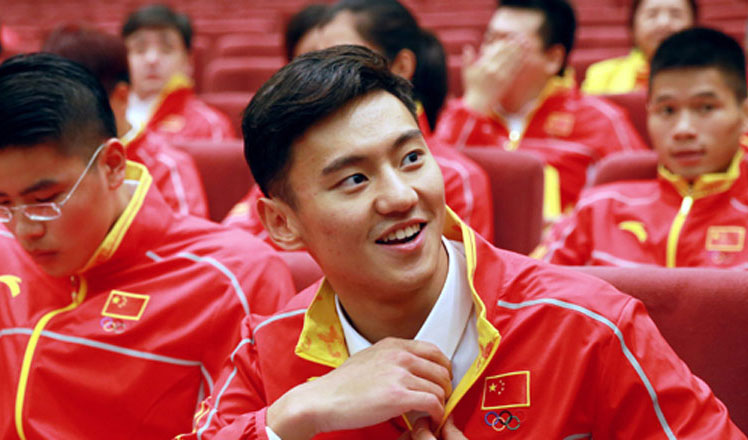
 Athletes ready to shine anew in Rio Olympics
Athletes ready to shine anew in Rio Olympics
 Jet ski or water parasailing, which will you choose?
Jet ski or water parasailing, which will you choose?
 Icebreaker Xuelong arrives at North Pacific Ocean
Icebreaker Xuelong arrives at North Pacific Ocean
 Tourists visit Yehliu Geopark in New Taipei
Tourists visit Yehliu Geopark in New Taipei
 Uphill battle for cyclists in downhill race in Zhangjiajie
Uphill battle for cyclists in downhill race in Zhangjiajie
 Shennongjia added to World Heritage List
Shennongjia added to World Heritage List
 Campers sleep perched on cliff face in Central China
Campers sleep perched on cliff face in Central China
Most Viewed
Editor's Picks

|

|

|

|

|

|
Today's Top News
Ministry slams US-Korean THAAD deployment
Two police officers shot at protest in Dallas
Abe's blame game reveals his policies failing to get results
Ending wildlife trafficking must be policy priority in Asia
Effects of supply-side reform take time to be seen
Chinese State Councilor Yang Jiechi to meet Kerry
Chinese stocks surge on back of MSCI rumors
Liang avoids jail in shooting death
US Weekly

|

|
